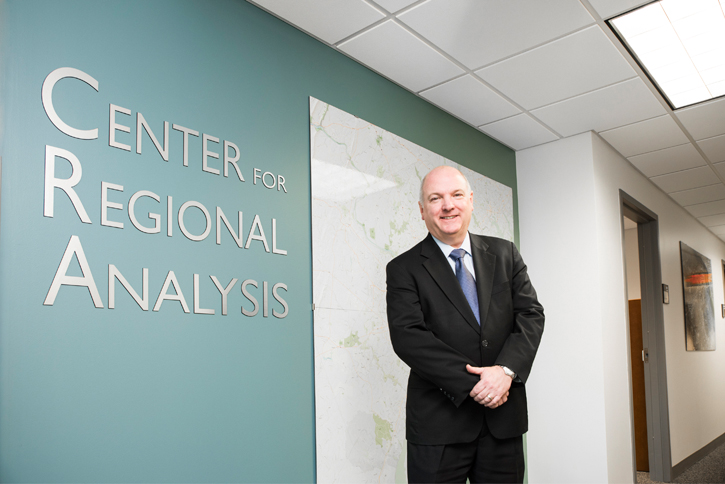
Mason economist Terry Clower, director of the Center for Regional Analysis, says his studies are informed by his ‘real world experience’ in business. Photo by Ron Aira.
It was the collapse of the job market in the early 1980s that put Terry Clower—who spends his days studying the vagaries of employment and other economic dynamics—on the path to the position he holds now as director of the Center for Regional Analysis at George Mason University.
The native Texan graduated from the Texas Maritime Academy at Texas A&M in 1982 with the intention of sailing ships, but the demand for boat pilots dried up and Clower found himself back on land, plying his trade for manufacturers, including one that owned a small fleet of over the road trucks. Over a decade, other positions took him further into logistics and management, and eventually economic development. He discovered he had an affinity for the field.
“My experience is what makes things interesting for me,” Clower said from his desk in a sixth floor corner office of George Mason’s Schar School of Policy and Government in Arlington, Va. “I’ve worked in the private sector, I’ve made budget decisions and know what companies are looking for to make important choices. And I know how to communicate with economic development practitioners and bring that to the classroom. It’s not just theoretical for me.”
Clower’s “classroom” on Wednesday, Feb. 1, will be the ballroom of the Fairview Park Marriott, where he will deliver a regional forecast for 600 business leaders attending the 25th annual economic conference hosted by Mason, Cardinal Bank, the Washington Business Journal and the Northern Virginia Chamber of Commerce.
This year’s conference theme is “Mapping New Economic Opportunities.” Also addressing the audience, among others, are Virginia Gov. Terry McAuliffe and Stephen Fuller, director of the new Stephen S. Fuller Institute for Research on the Washington Region’s Future Economy at the Schar School.
“Professor Clower and the Center for Regional Analysis are providing highly useful and timely economic and policy research and analysis to various private, nonprofit and public sector entities,” said Schar School dean Mark J. Rozell. “His work showcases the relevance of the research work being done in the Schar School for the greater Washington, D.C., region.”
Clower held a position similar to his role at Mason at the University of North Texas, where he earned his master’s degree and PhD and eventually led the university’s Center for Economic Development and Research as director from 2009 to 2014.
He noted that Virginia’s segmented regions—boasting sometimes vast cultural and economic differences—share similarities with the fragmentation of the Lone Star State.
“There are very distinct economic regions, with their own social cultures, and they have their own challenges,” he said. “The challenge we have in Northern Virginia for promoting job growth is completely at the other end of the spectrum from the challenges faced by [south central] or southwest Virginia.”
To familiarize himself with the commonwealth, Clower enrolled in Lead Virginia, a seven-month, nonprofit program that introduces corporate and civic leaders to priorities and concerns in regions other than their own. Clower said the experience was invaluable in exposing him to not just the economic differences but also to others who are addressing the state’s evolving challenges.
As for a preview of Wednesday’s talk, Clower said, “2017 is moving right along. I think we’ll see continued job growth but not as strong as we saw in 2015 and 2016, which were banner years.”
